|
What's "high fantasy"?
When I was a kid, that meant J. R. R. Tolkien.
You know, make-believe worlds with monsters, magic, maps, and muttering in made-up languages.
Not the pulp fiction stuff, but quality literature accessible to egg-headed 11 year olds.
Now, I hadn't touched Tolkien since childhood, but then the Lord Of The Rings movies came out and I was hooked again - me and a billion other people.
Unlike a billion other people, however, I got strangely obsessed with the question, "Where the heck did Tolkien come up with this stuff?"
Actually, if I'd been paying any attention I would have realized he got his ideas straight from sources like Beowulf and Norse mythology, and probably honestly claimed to be completely uninfluenced by modern high fantasy novels.
But being an idiot intent on wasting vast amounts of leisure time, I embarked on a quest to find truly Tolkien-esque novels that predated the master himself, and some of Tolkien's more obscure works like The Silmarillion (see below).
My quest failed, kind of, except that I discovered E. R. Eddison's strange, parallel development of a Middle Earth-like world, and had some fun with authors like Dunsany and Morris.
Maybe I should have stuck with old swords & sorcery hacks like Robert Ervin Howard, or the classic fantasy adventures of Edgar Rice Burroughs.
But I'm trying to at least pretend I've outgrown my childhood, and this body of high fantasy fiction has a little more depth.
So I don't feel too guilty about trying to talk you into checking some of this stuff out.
Now obviously, I'm not done wasting my time yet.
First of all, most of the classic pre-Tolkien novels fell into obscurity in the mid-20th century, but were revived in the late 60s and early 70s by the Ballantine Adult Fantasy series, edited by Lin Carter.
I'm now systematically working through the books in that series that are closest to the high fantasy genre.
I'm trying to exclude books that are set in distant futures, imaginary pasts, or altered historical periods of the planet Earth, although I'm making exceptions for some books drawing on traditional mythological sources like the Mabinogion.
Second, there's the dubious issue of swords & sorcery.
There is a fine line between high fantasy and that genre.
The former stems from Morris, the latter from Howard; the former often betrays its artistic pretensions with classical scholarship, the latter doesn't, and was produced for pulp fiction magazines and cheap trade paperbacks; the former focuses on conveying a sense of mystery and magic and is often pretty cerebral, the latter is entirely focused on delivering fast-paced adventure plotlines.
But both genres are about heroes battling their way through fantasy worlds with medieval milieus, the afore-mentioned monsters and magic, and typically pantheistic mythologies.
So despite my dig at REH, I am going to break down and review a couple of the classic series.
According to Lin Carter, the major authors through the early 70s were Poul Anderson, Carter, L. Sprague de Camp, John Jakes, Fritz Leiber, Michael Moorcock, Andre Norton, and Jack Vance.
I'm interested in Moorcock because I found his hero Elric compelling when I was a child, and in Norton because she was the only prominent female writer in the genre back in the old days, so she might have an interesting point of view.
Finally, despite the focus on predecessors to Tolkien, we're including some high fantasy writers from the first wave of the post-Tolkien era (meaning, from the mid-60s on).
In particular, Katherine Kurtz, Ursula Le Guin, Evangeline Walton, and Roger Zelazny seem like the highest priority.
Here are the books I have on my shelf...
- Poul Anderson, The Broken Sword; The High Crusade; Fantasy
- Hannes Bok, Beyond The Golden Stair
- James Branch Cabell, four more lousy books
- Humphrey Carpenter, Tolkien: A Biography
- Lin Carter, Thongor Against The Gods; Thongor And The Wizard Of Lemuria; The Enchantress Of World's End
- Lin Carter (editor), Flashing Swords! #1; Flashing Swords! #2; Flashing Swords! #3 (anthologies of stories by Poul Anderson, Carter, Avram Davidson, John Jakes, Katherine Kurtz, Fritz Leiber, Michael Moorcock, Andre Norton, L. Sprague de Camp, and Jack Vance)
- John Christopher, Beyond The Burning Lands
- Avram Davidson, The Phoenix And The Mirror; Collected Fantasies
- E. R. Eddison, A Fish Dinner At Memison; The Mezentian Gate
- Gantz (translator), The Mabinogion
- Alan Garner, The Moon Of Gomrath
- Jane Gaskell, The Serpent; Atlan; The City
- H. Rider Haggard and Andrew Lang, The World's Desire
- Niel Hancock, Greyfax Grimwald
- C. J. Cutliffe Hyne, The Lost Continent
- Katherine Kurtz, Deryni Rising; Deryni Checkmate; High Deryni
- David J. Lake, Walkers On The Sky
- Ursula K. Le Guin, A Wizard Of Earthsea; The Tombs Of Atuan; The Farthest Shore
- Fritz Leiber, Swords And Deviltry; Swords Against Death; The Swords Of Lankhmar; Swords & Ice Magic (first, second, fifth, and sixth of the Fafhrd and the Gray Mouser series); also, Gather, Darkness!
- H. P. Lovecraft, The Survivor & Others; The Dream-Quest Of Unknown Kadath; The Tomb; At The Mountains Of Madness; The Lurking Fear; Fungi From Yuggoth & Other Poems; The Shuttered Room
- Malory, Le Morte d'Arthur
- A. Merritt, Dwellers In The Mirage
- Michael Moorcock,
Stormbringer;
The Singing Citadel;
The Vanishing Tower a.k.a. The Sleeping Sorceress;
Elric Of Melnibonë a.k.a. The Dreaming City;
The Sailor On The Seas Of Fate; Elric At The End Of Time (all from the Elric series);
The Jewel In The Skull (first book of the Runestaff series);
The Queen Of The Swords;
The Bull And The Spear (second and fourth books of the Corum series)
- C. L. Moore, Jirel Of Joiry
- Kenneth Morris, The Chalchiuhite Dragon
- William Morris, The Glittering Plain; The Water Of The Wondrous Isles; The Sundering Flood; Three Works
- H. Warner Munn, Merlin's Ring; Merlin's Godson
- Andre Norton, Witch World; Web Of The Witch World; Three Against The Witch World; Year Of The Unicorn; Warlock Of The Witch World; Sorceress Of The Witch World; Spell Of The Witch World (first through seventh of the series)
- Mervyn Peake, Gormenghast; Titus Alone
- Fletcher Pratt, The Blue Star
- Fletcher Pratt and L. Sprague de Camp, Land Of Unreason
- George Henry Smith, Witch Queen Of Lochlann
- Thomas Burnett Swann, Day Of The Minotaur; The Weirwoods; The Dolphin And The Deep; Moondust; Where Is The Bird Of Fire?; The Forest Of Forever; The Goat Without Horns; Green Phoenix; Wolfwinter; Lady Of The Bees; Cry Silver Bells
- Jack Vance, The Dying Earth
- Evangeline Walton, The Song Of Rhiannon; Prince Of Annwn
- Roger Zelazny, The Guns Of Avalon; Sign Of The Unicorn; The Hand Of Oberon; The Courts Of Chaos (second through fifth in the Amber series)
I'm still looking for a bunch of junk too:
- Leslie Barringer, Gerfalcon; Joris Of The Rock; Shy Leopardess
- Peter S. Beagle, The Last Unicorn
- James Branch Cabell, The Cream Of The Jest (Ballantine Adult Fantasy version)
- John Christopher, The Prince In Waiting; The Sword Of The Spirits
- Avram Davidson, Island Under The Earth; Ursus Of Ultima Thule
- Lord Dunsany, Over The Hills And Far Away; The Food Of Death: Fifty-One Tales
- Alan Garner, The Weirdstone Of Brisingamen; Elidor
- Jane Gaskell, The Dragon; Some Summer Lands
- H. Rider Haggard, The People Of The Mist
- M. John Harrison, The Pastel City
- William Hope Hodgson, The Night Land
- Henry Kuttner, The Dark World
- Ursula K. Le Guin, Tehanu
- H. P. Lovecraft, The Doom That Came To Sarnath
- Patricia A. McKillip, The Throme Of The Errill Of Sherill; The Forgotten Beasts Of Eld
- Michael Moorcock,
The Stealer Of Souls
- Kenneth Morris, The Fates Of The Princes Of Dyfed; Book Of The Three Dragons
- Clark Ashton Smith, Zothique; Xiccarph; Poseidonis
- Thomas Burnett Swann, whatever, I'm getting completely carried away
- Jack Vance, The Eyes Of The Overworld
- T. H. White, Once And Future King
I'm all ears if anyone has some more suggestions.
Note: the ratings range from one star (so bad I can't finish reading it) to five stars (Lord Of The Rings, which is so overdiscussed I won't bother reviewing it; likewise The Hobbit, which I'd give four and a half stars). (JA)
I have to take some of the blame for Alroy's latest obsession; I think I was the one who pointed him toward Eddison when he was first looking for Tolkien antecedents. To those of you who think fantasy is silly and childish I would say, well, yeah, that's what's so great about it. Except for high fantasy, which is equally silly - or more - but not childish. Anyway, here's some stuff I'm either looking for, have lying around somewhere in my apartment, or have read but haven't gotten around to writing up:
- E. R. Eddison, A Fish Dinner At Memison; The Mezentian Gate
- Ursula K. Le Guin, The Farthest Shore; Tehanu
- Mervyn Peake, Gormenghast; Titus Alone
(DBW)
Page introduction by John Alroy.
Dueling reviews by John Alroy (JA) and David Bertrand Wilson (DBW).
Yeah, the record review guys.
Gotta blame someone.
|
 Poul Anderson, Three Hearts And Three Lions (1961) Poul Anderson, Three Hearts And Three Lions (1961)
A clichéd but highly entertaining stab at fantasy by the famed science fiction writer.
Danish World War II partisan fighter Holger Carlsen is suddenly transported out of dire straits into the Middle World, an alternate universe combining bits of medieval history and loads of traditional European folk tale elements.
Carlsen, reinvented as a messianic knight, encounters all the usual suspects in a series of adventures as he crosses the alien landscape: a second-rate witch, a bunch of evil upper crust full-size elves living in Faerie, the obligatory unicorn, a riddle-loving giant, a town-terrorizing werewolf, a rather nasty mermaid, a nearly unkillable troll, even Morgan le Fay, the chief bad guy.
He picks up a few comrades along the way, all of whom you could do without: the occasionally annoying dwarf Hugi, who's around to provide some not very comic comic relief; the thinly portrayed teenager Alianora, who can turn herself into a swan; and later the slick-talking Carahue the Saracen.
Hugi and Alianora speak in unconvincing archaic English while the engineering-trained Holger speculates about scientific explanations for all the weirdness, which like everything renders the proceedings a bit silly.
There's also some moderately annoying Christian mumbo jumbo towards the end.
But Anderson is such a skilled writer that he pretty much pulls all of this off - it's a well-paced tale, imaginative but believable if you accept its hokey premises.
Robert Heinlein should have taken some notes when he wrote the somewhat similar testosterone-fest Glory Road.
|
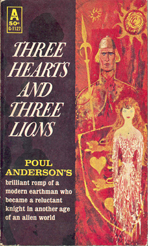
|
|
|
 Hannes Bok, The Sorcerer's Ship (1942) Hannes Bok, The Sorcerer's Ship (1942)
Back in the good old days, a well-known science fiction illustrator could switch genres and write his own pulp fiction fantasy novel.
And back in the good old days, you could publish a book with thin characterization, an implausible plot, and grade-school English and not only get away with it, but get your book republished in the Ballantine Adult Fantasy series as if you were some kind of legendary, lost literary figure.
At least Bok knew how to tell an entertaining story.
The plotline might be routine, but it is fun, and quickly, efficiently told: an average Joe New Yorker is transported to a watery swords and sorcery world, wins the princess, explores a weird abandoned city, survives some clumsy palace scheming and a couple of battles, and hooks up with a goofy, kind-hearted alien creature of a sorcerer who saves the day.
Bok relies on a literal deus ex machina to tie things up, but the way he does it is interestingly weird, and the democratic socialist politics that seem to come out of nowhere at the very end make the book an interesting relic - most fantasy espouses a macho right-wing philosophy if it takes sides at all.
Harmless and shallow stuff, but amusingly idiosyncratic. (JA)
|
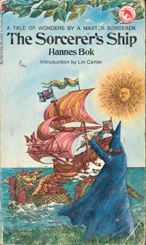
|
|
|
 James Branch Cabell, The Cream Of The Jest (1917) James Branch Cabell, The Cream Of The Jest (1917)
Wow, you've got to give this guy credit for his utter audacity.
A post-modern novel way, way before other fantasy writers dared to be so experimental, this is a self-referential, story-within-a-story yarn about a middle-aged, well-to-do suburban house husband who disappears nightly into random moments of history, accompanied by his platonic lover Etarre, a literal and figurative stand-in for all the unattainable women who ever existed.
Or is it all a figment of his imagination?
Clever, clever, clever.
Um, okay, so there's one little problem.
It's terrible.
The hero is so drab and self-involved you can't bear to hang out with him, Etarre is so abstract she's completely uninteresting, and their adventures are so truncated, arbitrary, and humorless they just seem silly.
Worse, Cabell pads the story with tedious philosophical ramblings - he seems desperate to justify Christianity, but the whole argument is ridiculous when it's not impenetrable.
You can sense a clever mind at work here, but it's just amazing to see how Cabell completely reinvented himself with the next novel.
And it's depressing to note that Cabell was the first American to get involved with adult fantasy writing. (JA)
|
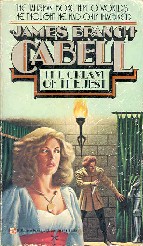
|
|
|
 James Branch Cabell, Jurgen (1919) James Branch Cabell, Jurgen (1919)
Cabell's masterpiece is a satirical tour de force, giddily creative and brilliantly witty.
Nearly banned for its clever sexual innuendo, the book is actually a meditation on middle age and the emptiness of promiscuity, with the hero suddenly transformed into a youth and embarking on a bizarre series of sexual conquests, and adventures in ever more fantastic landscapes populated with wildly colliding mythological and literary figures - he literally goes to hell and marries a vampire, among several other women.
Hoodwinking everyone he meets and promoting himself from a pawnbroker all the way up to an emperor and then a pope, Jurgen is a such a scoundrel you just can't resist him.
There's even a bunch of cutting religious satire, with a "God" who's just a fantasy of Jurgen's grandmother, and an even more supreme being who seems utterly capricious.
It's no surprise that Cabell chickens out and has Jurgen return to his real age and his shrewish wife at the end, but he's clearly having a blast through the rest of the book, and so will you. (JA)
|
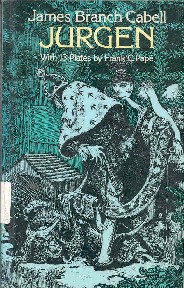
|
|
|
 James Branch Cabell, Domnei (1920/26) James Branch Cabell, Domnei (1920/26)
Cabell's first, failed novel, written in 1912 but widely released in 1920, paired with a later novella called "The Music from Behind the Moon."
It's pretty bad, if not as painful as Cream of the Jest.
Set largely in Cabell's medieval fantasy land of Poictesme in southern France, and in a make-believe Oriental realm, it features the world's most fast-moving plotline, with the heroic Perion going through endless implausible gyrations to rescue the stiff heroine Melicent from the crude heathen dictator Demetrios.
Hey, he's Greek, he must be a slob.
With clumsy dialogue, two-dimensional characters, sketchy scenery, oppressive Victorian mores, and even some gratuitous anti-Semitism, the novel is only saved by the pulp fiction plot developments, which are so ridiculous they seem like a big put on.
Actually, Jurgen isn't so very different, except that it is a big put on.
Meanwhile, the novella is much better, with an interesting one-page-per-scene formal structure, some Dunsany-like fantasy, and the same smirking innuendo that made Jurgen so much fun.
I have a small pile of other, later Cabell novels also revolving around his Poictesme mock-history, but I'm not sure I'll be able to slog through them. (JA)
|
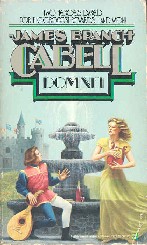
|
|
|
 Joy Chant, Red Moon And Black Mountain (1971) Joy Chant, Red Moon And Black Mountain (1971)
The most slavish Tolkien ripoff I've yet seen, right down to the specifics: the hobbits (the three English children magically transported to the world called Vandarei) including Frodo (the messianic oldest brother Oliver), Sauron (Fendarl), the Rohirrim (the Khentors), the Numenoreans (the Harani), even Tom Bombadil (the Borderer) and Gwaihir the Windlord (the eagle King Merekarl).
Sure, there are no dwarves or elves or interesting monsters, and Chant makes a major strategic error by not introducing a Shakespearean character like Gollum - everyone's basically all good or all bad.
There are also some strange ideas like Oliver's implausibly rapid transformation into a grownup warrior who inexplicably forgets his origins.
But I'll settle for it; I'm way too addicted to Tolkien not to get a rise out of such a thing.
And at least the female characters like the little girl Penny, the motherly Princess In'serinna, and the romantically frustrated teenager Mneri are much more strongly developed - actually, it's well-written in general, although it veers into melodrama and silliness, and isn't able to create a world as rich and believable as Middle Earth.
Recommended if your copy of the Trilogy is falling apart from too many readings. (JA)
|
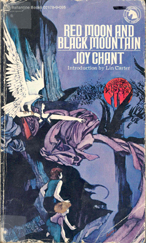
|
|
|
 Lord Dunsany, At The Edge Of The World (1906 - 1916, collected 1970) Lord Dunsany, At The Edge Of The World (1906 - 1916, collected 1970)
The remarkable Irish polymath Edward Plunkett, heir to an ancient barony, classical scholar, world traveler, chess player, and playwright, was the most lyrical and imaginative fantasy writer of the early 20th century.
Thanks to his short attention span, he's really at his best writing short stories: this BAF greatest hits compilation is drawn from seven short story collections, and it's remarkably diverse.
Dunsany knocks off a new fantasy land in every piece, complete with exotic made-up names and musty mythological atmospheres - he's better than any other English fantasy writer at drawing from the colonial scenery and cultural knickknackery of the British empire.
When he bothers with philosophical allegories, he does it brilliantly, although he's mostly concerned with sketching creepy, doom-laden visions populated with gods, monsters, fantastical cities, and diverse landscapes.
His characters are hollow, he doesn't use much dialogue, and occasionally he tries to bring in elements of the real Edwardian world, which mostly doesn't work.
But together, this is a landmark body of work, clearly influencing writers like H. P. Lovecraft and setting a standard for fantasy writing that few others were able to meet. (JA)
|
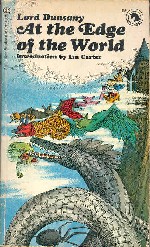
|
|
|
 Lord Dunsany, Beyond The Fields We Know (1905 - 1929, collected 1972) Lord Dunsany, Beyond The Fields We Know (1905 - 1929, collected 1972)
Lin Carter really started scraping the bottom of the barrel with this collection, which is a total hodgepodge.
There's Dunsany's complete novella The Gods of Pegana, his first published book from 1905.
There's a bunch of good to really good stories in his classic style, from several of the books already plundered in the previous collection.
There's Dunsany's remarkably simplistic and hackneyed 1910 play King Argimenes and the Unknown Warrior.
There's a set of bland and almost amateurish poems from his 1929 collection Fifty Poems.
And finally, there's a silly but amusing long-format pirate tale ("A Story of Land and Sea").
The collection really starts out slow, because Gods of Pagana is little more than an exercise in making up an elaborate fantasy mythology that describes a pseudo-Greek pantheon using a biblical storytelling style.
Although it presages the first part of The Silmarillion, it's a bloody bore, a bunch of irritatingly short mini-stories with incredibly sketchy characters, and basic plotlines that only rarely sport Dunsany's famous surprise endings.
And the rest is too rocky to really make up for it.
Worth checking out, but you might want to just skip through the dull parts.
(JA)
|
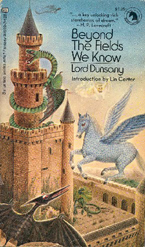
|
|
|
 Lord Dunsany, Don Rodriguez: The Chronicles Of Shadow Valley (1922) Lord Dunsany, Don Rodriguez: The Chronicles Of Shadow Valley (1922)
Like so much high fantasy, a coming of age story: young Rodriguez is a nobleman who doesn't inherit his father's castle because his skill with the sword and mandolin enable him to win his own castle and princess. And like so much Dunsany, the story starts off brilliantly and peters out completely. The opening chapters, where Rodriguez spends a memorable night at an inn and hooks up with the slovenly sidekick Morano, overflow with wit, charm, and a sly acknowledgment of the genre's nostalgia for a time that never actually existed. But by the half-way point, Dunsany's losing interest, and the language grows dry and mechanical as the incidents become little more than a travelogue punctuated by anticlimaxes.
Worse yet, the longer the story goes on, the more conscious you become that not only is he borrowing Don Quixote's device of a young swordsman with a naive view of chivalry and a down-to-earth foil, he's not bringing anything else to the party... stick with Cervantes.
(DBW)
|
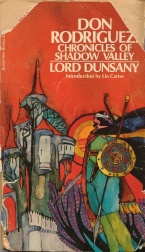
|
|
|
 Lord Dunsany, The King Of Elfland's Daughter (1924) Lord Dunsany, The King Of Elfland's Daughter (1924)
Dunsany's a genius, but here he just can't keep his attention focused long enough to create an engaging plotline.
I'm not sure why I should care whether the noble Alveric succeeds in his obsessive, years-long, low-budget wandering quest to recapture his long-lost elvish wife Lirazel, and their unicorn-hunting son Orion seems about as deep as the average duck-hunting redneck.
Dunsany can barely be bothered to imagine a world outside the tiny domain of Erl; the plot seems aimless in the middle; and the ending is an arbitrary anti-climax.
Still, Dunsany's vision of an Elfland where time almost stands still is strikingly beautiful, and he almost randomly throws in some bouncing, daffy trolls who really lighten things up.
His language is economical and gorgeous, and there are moments of giddy imagination all over the place.
Dunsany's more in command when he doesn't have a whole book to fill out, but if you want to reside in one of his fantasy landscapes for more than 20 minutes, you'll have to move on from the short stories. (JA)
I could've finished this one, I guess, but I really didn't see the point... Elfland, like Heaven, is a place where nothing ever happens, and the characters are faceless ciphers, so it doesn't matter where they end up. Plus, the writing is breezy, without the satisfying richness and sly asides Dunsany is prone to in other works, so there's not much impetus to keep turning the pages.
I won't give the book a rating, because I never made it to the trolls, but this isn't the place to start with His Lordship.
(DBW)
|
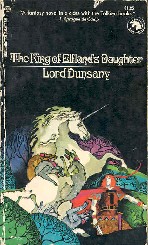
|
|
|
Lord Dunsany, The Charwoman's Shadow (1926)
 - The most well-constructed work of Dunsany's I've read is also his least charming, focusing on the adventures of a pallidly sketched young man in the "Golden Age" of Spain (there's so little geographic or cultural detail it could just about be anywhere anywhen).
Don Ramon Alonzo leaves home to make a killing in the transmuted gold business by apprenticing to a rather distant and intermittently malign magician, but gets sidetracked by trying to rescue the magician's ancient female servant (you can see where that's going right away).
There is a bunch of imaginative magic going on, including the central device of both characters having literally pawned their own shadows to the creepy old guy.
Shuttling back and forth between Ramon Alonzo's small family castle, the magician's lair, and a nearby town, it's a pretty self-contained world, but Dunsany creates some involving dramatic incidents and his language is as beautiful (if not as rapturous) as always. (JA) - The most well-constructed work of Dunsany's I've read is also his least charming, focusing on the adventures of a pallidly sketched young man in the "Golden Age" of Spain (there's so little geographic or cultural detail it could just about be anywhere anywhen).
Don Ramon Alonzo leaves home to make a killing in the transmuted gold business by apprenticing to a rather distant and intermittently malign magician, but gets sidetracked by trying to rescue the magician's ancient female servant (you can see where that's going right away).
There is a bunch of imaginative magic going on, including the central device of both characters having literally pawned their own shadows to the creepy old guy.
Shuttling back and forth between Ramon Alonzo's small family castle, the magician's lair, and a nearby town, it's a pretty self-contained world, but Dunsany creates some involving dramatic incidents and his language is as beautiful (if not as rapturous) as always. (JA)
 - This was the first Dunsany I picked up, and I was hooked from the opening pages, where Ramon Alonzo recoils in horror at the thought of working for a living, and goes off to become a magician instead. The prose is distinctly otherworldly without being needlessly archaic, the plot moves at a good clip, the touches of humor never detract from the overall tone - in all of these areas, Dunsany excelled nearly all the fantasists who would come after him. And you may never take your shadow for granted again. (DBW) - This was the first Dunsany I picked up, and I was hooked from the opening pages, where Ramon Alonzo recoils in horror at the thought of working for a living, and goes off to become a magician instead. The prose is distinctly otherworldly without being needlessly archaic, the plot moves at a good clip, the touches of humor never detract from the overall tone - in all of these areas, Dunsany excelled nearly all the fantasists who would come after him. And you may never take your shadow for granted again. (DBW)
|
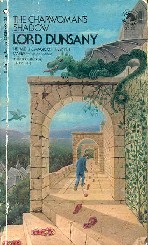
|
|
|
E. R. Eddison, The Worm Ouroboros (1926)
 - God-like heroes, lovingly depicted battles, vast landscapes, deathly visions, terrifying monsters, whiplash-inducing plot twists, epic quests, gaudy palace decor, naval battles, fierce little kingdoms with misleadingly monstrous names, vertigo-inducing mountain climbing, a bizarre plot resolution, even some discreet sex - E. R. Eddison throws everything imaginable at the reader.
Actually, he throws everything almost unintelligible at the reader, because he's a hard-core Elizabethan scholar, so he lards the text with some of the most difficult Shakespearean English you could possibly imagine.
I literally had to read this can't-put-it-down 500 page book with a dictionary in one hand, looking up as many as a dozen words per page.
But hey, it's educational!
No pain, no gain, right?
The war-loving Demons aren't the most sympathetic good guys in the world, but talk about villanous villains: the Witches are as bad as bad gets, complete with a fascinatingly treacherous key player.
Eddison was unquestionably an imperialistic, sexist, racist he-man, with none of Tolkien's common touch - he was practically a proto-Nazi, and it's no coincidence the humanistic Tolkien knew but despised the man.
But if you're going to go anywhere back before Tolkien, I think this is the place to start, as I did. (JA) - God-like heroes, lovingly depicted battles, vast landscapes, deathly visions, terrifying monsters, whiplash-inducing plot twists, epic quests, gaudy palace decor, naval battles, fierce little kingdoms with misleadingly monstrous names, vertigo-inducing mountain climbing, a bizarre plot resolution, even some discreet sex - E. R. Eddison throws everything imaginable at the reader.
Actually, he throws everything almost unintelligible at the reader, because he's a hard-core Elizabethan scholar, so he lards the text with some of the most difficult Shakespearean English you could possibly imagine.
I literally had to read this can't-put-it-down 500 page book with a dictionary in one hand, looking up as many as a dozen words per page.
But hey, it's educational!
No pain, no gain, right?
The war-loving Demons aren't the most sympathetic good guys in the world, but talk about villanous villains: the Witches are as bad as bad gets, complete with a fascinatingly treacherous key player.
Eddison was unquestionably an imperialistic, sexist, racist he-man, with none of Tolkien's common touch - he was practically a proto-Nazi, and it's no coincidence the humanistic Tolkien knew but despised the man.
But if you're going to go anywhere back before Tolkien, I think this is the place to start, as I did. (JA)
 - One of a very few books (with Tristram Shandy and the Bill James Baseball Abstracts) I re-read regularly. It starts slow, with practically pornographic descriptions of the enormous glistening jewels adorning the Demons' throne room as some loser named Lessingham asks dumb questions, but once it gets going you're immersed in a world of wondrous extremes, where you can count on nothing ordinary happening. Brandoch Daha is a paradoxically foppish hero, Lord Gro is one of literature's great villains, and the minor figures like Lady Sriva are whisked offstage while there's still some mystery to them. "'Tis writ somewhat crabbedly," no doubt, and Eddison's bloodlust may be hard to stomach, but if you can hang in with it, the book's rewards are incomparable.
(DBW) - One of a very few books (with Tristram Shandy and the Bill James Baseball Abstracts) I re-read regularly. It starts slow, with practically pornographic descriptions of the enormous glistening jewels adorning the Demons' throne room as some loser named Lessingham asks dumb questions, but once it gets going you're immersed in a world of wondrous extremes, where you can count on nothing ordinary happening. Brandoch Daha is a paradoxically foppish hero, Lord Gro is one of literature's great villains, and the minor figures like Lady Sriva are whisked offstage while there's still some mystery to them. "'Tis writ somewhat crabbedly," no doubt, and Eddison's bloodlust may be hard to stomach, but if you can hang in with it, the book's rewards are incomparable.
(DBW)
|
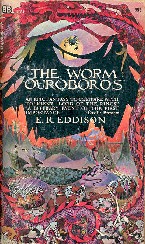
|
|
|
 E. R. Eddison, Mistress Of Mistresses (1935) E. R. Eddison, Mistress Of Mistresses (1935)
Weighed down by interminable philosophical/poetic mumbo jumbo whenever one of Eddison's quasi-divine female characters shows up, light on magic and monsters, and heavy on the palace intrigue, this is still strikingly if sporadically entertaining.
Eddison has invented a new fantasy land to the south of the Ouroboros milieu, and it's more geographically coherent, with a more linear and plausible plotline, an unimpeachable hero, fewer but equally effective battle scenes, and thankfully, some less impenetrable if still extremely archaic vocabulary.
Some of the characterization is strong and the dialogue witty, Eddison ladles out some of his elaborate scenery, and with all the shifting alliances and crowds of selfish characters, he creates an interesting plot device of not making it clear which side is "good" and which "bad" until half way through the book.
Despite a disappointingly abrupt ending, the book is still a good distraction if you can somehow plow through the ranting, raving romantic interludes. (JA)
Every time I read Ouroboros, I say to myself, "This time I'm going to get through Mistress, and then on to A Fish Dinner In Memison!" I even bought the book a second time in paperback so I wouldn't have to carry around the huge Zimiamvia volume that contains those books plus the unfinished The Mezentian Gate. But it's so unbelievably talky and dull I just can't read the damned thing. (DBW)
|
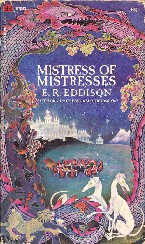
|
|
|
 Robert Heinlein, Glory Road (1963) Robert Heinlein, Glory Road (1963)
I'm just the man for this job.
If you're going to review a sci fi novel thinly disguised as fantasy, you've got to have guts.
You've got to know that important judgments should be made by the elite, and democracy doesn't work in reviewing.
You've got to be wowed by Heinlein's premise of a Vietnam vet recruited to teleport between planets so he can hack and slash his way through fantasy monsters, rescue his sexy goddess-like female employer, and carry out a Holy Grail-style quest.
You've got to get a rise out of Heinlein's references to Burroughs and Cabell, and even a mention of hobbits, although he's more interested in wild-eyed science fiction speculation.
You've got to think that cliché-ridden tough-guy dialogue is screamingly funny instead of ridiculous.
You've got to be macho enough to write off the book's long hang-wringing "unhappily ever after" coda.
You've got to realize that women are manipulative bitches, or you won't appreciate Heinlein's insightful misogyny and forthright obsession with sex.
And seriously, you've got to be impressed with Heinlein's jaded view of the Vietnam war, way before that was fashionable, his ability to keep a plotline moving along, and the sheer wackiness of the whole thing.
But maybe I've got better things to do. (JA)
|
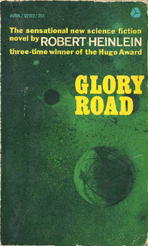
|
|
|
 Ursula K. Le Guin, A Wizard of Earthsea (1969) Ursula K. Le Guin, A Wizard of Earthsea (1969)
Where I come from, the most enjoyable fantasy results from a writer starting with a supernatural archetype and then treating it naturalistically, so you actually imagine real people in those fanciful situations. For all its erudition, Tolkien's trilogy is mostly about questions like "What do heroes eat while they're on a quest to save the world?" Le Guin sets up a world where magic works (provided you have the gift and you know the True Name of whatever you're trying to work magic on), and answers the question "Where do wizards learn their wizardry?" So young Sparrowhawk goes from the remote island of Gont to the central island of Roke, and enters the School for Wizards, while trying to come to terms with his tremendous talent for magic and the equally tremendous temptation to use it for Not-Good.
Yep, another coming of age story, and more suspenseful than most, because you really don't know how the main character is going to handle the challenges he's created for himself. When I recently re-read the book, I was struck by how many incidents Le Guin crams into a relatively short narrative - one minute Sparrowhawk is tending a sick youth on a humble island, the next he's grappling with a Nameless Power in the frozen north - without ever seeming choppy, which is a testament to her simple, elegant prose style and an unerring sense of pacing.
(DBW)
|
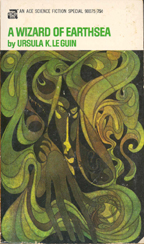
|
|
|
 Ursula K. Le Guin, The Tombs of Atuan (1970) Ursula K. Le Guin, The Tombs of Atuan (1970)
This time, Le Guin introduced a couple of radical concepts to fantasy: 1) a woman's life might be as interesting to read about as a man's; and 2) a main character's internal life might be more interesting than their feats of derring do.
The main character doesn't even have any magic powers: Arha is a lonely young woman taken from her parents and trained since early childhood to be a high priestess in service of nameless forces no one quite believes in anymore. When she finds an intruder - a personable young wizard, no less - in the labyrinth beneath her gods' most sacred shrine, resulting events lead her to experience shock, anger, scorn, fear and finally friendship, which puts her in a very touchy spot with her human and supernatural superiors.
Structurally, the book could hardly be more different from Wizard: the plot unfolds slowly, and virtually everything takes place in one location, unlike the whirlwind tour of Earthsea's many islands the first book had taken us on. But it's equally vivid, and for me even more rich and involving;
Le Guin creates a heroine who's mixed-up and uncertain but still unmistakeably heroic, grounded by prose that's clear and concrete but never ordinary.
(DBW)
|
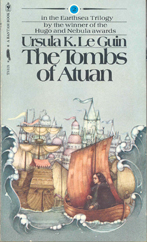
|
|
|
 Ursual K. Le Guin, Orsinian Tales (1976) Ursual K. Le Guin, Orsinian Tales (1976)
This is a collection of otherwise unrelated short stories that all are set in a vaguely located, make-believe Eastern European country (the word "Orsinia" appears nowhere within the book).
Otherwise, they're not fantasy in any sense, and certainly not high fantasy.
Most of them take place in the early or middle 20th century in grim little cities and bucolic countryside dwellings, and here she's masterful at suggesting the oppressive gloominess of poverty and totaliarianism.
There's also a piece that describes a rather gentlemanly 17th century civil war, and a creepy tale of murder from the 12th century.
Mostly, though, her subject matter could hardly be more mundane: what she's really interested in is the slow, stately rhythms of domestic life, with people of all ages, occupations, and temperaments being portrayed.
Often she uses a flawed, frustrated love affair as a plot device, but just as often hardly anything is going on at all.
The book couldn't possibly be farther from swords and sorcery, but if you want to be completely transported into other people's lives, this is a deeply engrossing, if scattershot, diversion. (JA)
| 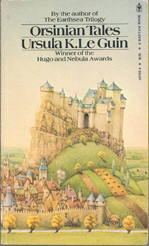
|
|
|
 David Lindsay, A Voyage To Arcturus (1920) David Lindsay, A Voyage To Arcturus (1920)
Transported to a planet filled with bizarre landscapes and creatures, an Earth man wanders on a spiritual journey.
He encounters a series of mostly telepathic, low-tech aliens one or two at a time, most of whom quickly end up dead.
Everything is an allegory for a Big Idea: Perception, Delusion, Jealousy, Compassion, Sin, Love, Worship, Male vs. Female.
What Lindsay seems to be driving at is that Life is Will thwarted by Pleasure.
No, you don't have a Will to have Pleasure; everything is governed by a universal Will that leads to Pain.
Uh, been reading a little too much Schopenhauer, have we now?
You can get frustrated with the book pretty easily, actually.
Our hero Maskull seems like a blank slate, letting the aliens play with his emotions and never really taking his own philosophical position.
The plot, like Maskull, seems utterly aimless.
The characters seem wooden and take unjustifiably extreme actions.
The dialogue is confusing and abstract.
The violence is perfunctory and unexpected.
But you know, it's so swift-moving, whacked out, and hallucinatory, that this completely unique novel is entertaining from start to finish, just as long as you check your conventional standards for fiction at the door.
(JA)
|
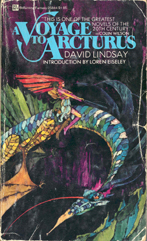
|
|
|
 P. M. Matarasso (translator), The Quest Of The Holy Grail (1969) P. M. Matarasso (translator), The Quest Of The Holy Grail (1969)
The honest to goodness original version of the Arthurian romance that fits into the Lancelot/Holy Grail cycle (including the Mort Artu = Death Of Arthur), written in France by an anonymous author in about 1225.
As such, it's a primary source for all of the high fantasy that came later - if Morris and Tolkien didn't read it, well, they must have been indirectly influenced by it.
Unfortunately, the book is basically Christian propaganda.
Although the main characters and some of the many bizarre events stem from what must have been far more entertaining Celtic mythology, here everything is just an excuse for lecturing.
The formula is simple and repetitive: the four main knights on the quest, the morally flawed Lancelot, his infallibly virtuous bastard son Galahad, Perceval, and Bors, wander through a vaguely sketched fantasy landscape having random, mostly violent encounters, often with the devil in various disguises; other, nameless knights; or each other.
After each incident, the knight runs into a hermit, monk, or other holy man, and suffers through a long discourse on the allegorical meaning of what has just happened.
There's so much poorly-founded guilt-tripping in all of this stuff that it's almost unbearable.
So the book is full of fantastic visions and fascinating from a scholarly point of view, but, well, not a lot of fun.
(JA)
|
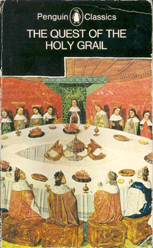
|
|
|
 A. Merritt, The Moon Pool (1919) A. Merritt, The Moon Pool (1919)
Everyone has to start somewhere, and Merritt - a leading fantasist in his day though largely forgotten - started off by ripping off Edgar Rice Burroughs. This story takes place in a subterranean world not unlike ERB's Pellucidar, as a hardy band of adventurers pursue their lost comrades down a rift in the Earth's crust, and find themselves among races of frogmen, dwarves, and impossibly beautiful women.
He even borrows minor ERBisms like describing the local units of measure in excessive detail.
There's very little supernatural element (aside from the Dweller in the Moon Pool), and the heroes make their way with guts, wits, and an occasional blast of gunfire. The main hero, Larry O'Keefe, doesn't get to tell his own story, which is a shame because his speech - peppered with American slang and Irish brogue - is a lot more interesting than the squaresville narrator William Goodwin.
So it's just run of the mill action-adventure, really, but it's interesting if you like his later stuff because so many of his dominant themes are introduced: there are ancient races of lost people; the hero has to choose between an incredibly beautiful dangerous woman and an unbelievably beautiful demure woman; many battles are ultimately resolved by brilliant pulsating light beams. And Merritt, a frequently published botanist, indulges that passion here, with sumptuous descriptions of flora both above and below ground. (DBW)
|
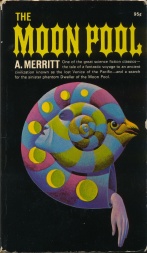
|
|
|
 A. Merritt, The Metal Monster (1920) A. Merritt, The Metal Monster (1920)
Writing in the aftermath of World War One, Merritt found a timely theme: mankind threatened by a soulless, merciless, hive-minded race of geometric metal shapes capable of combining into an endless variety of monstrous forms, like Lego blocks gone evil, able to destroy all life without a second thought. Unfortunately, he gets unbearably carried away in describing the animated cubes, pyramids and spheres - and their interminable journeys across the Tibetan landscape - to such an extent that writer and reader both forget that there's supposed to be a story in progress. There's a good fifty-page stretch where there's no dialogue aside from the occasional "Golly gee whiz!" interjection, and he never takes time to develop any interest in the human protagonists.
Merritt mixes in his usual elements, but they seem like afterthoughts: the exotic landscape is rarely described; the lost race of ancient Persians is barely discussed; the male-bonding banter between Goodwin (the same dullard from Moon Pool) and tough guy Dick Drake is forced. Even the inexpressibly beautiful, quasi-human, oft-unclad Norhala remains a cipher: not only do you not understand why she's been adopted by (yet seems to have some power over) the mechanical creatures, you don't care.
(DBW)
|
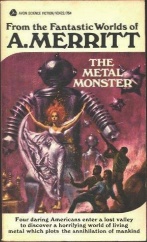
|
|
|
 A. Merritt, The Ship Of Ishtar (1924) A. Merritt, The Ship Of Ishtar (1924)
Merritt shifted focus sharply for this pure fantasy yarn
about a modern-day historian, John Kenton, who finds a miniature ship in a block of Babylonian stone and is soon drawn into a magical world of derring-do.
Much more bloodthirsty and crude than Merritt's other novels, and between the mightily-thewed hero, the skulking shaven-pated priests, and the beautiful, imperious (but quickly subjugated) love interest, it's easy to picture a young Robert E. Howard drinking deep at this fountain. Somewhat overwritten as well, with a huge number of one-sentence paragraphs ending in exclamation points, and he overuses the device of Kenton being drawn back into his own world at critical moments.
But Merritt does throw in a couple of his memorable minor characters - notably, the drunken King of the Two Deaths - he admirably resists the conventional ending, and as with his later stories, he strikes just the right tone with writing about superhuman characters (in this case, the gods Nabu, Nergal and Ishtar), not overawed by their magnificence, but not reducing them to just plain folks with special powers, either.
(DBW)
|
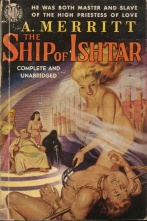
|
|
|
 A. Merritt, Face In The Abyss (1931) A. Merritt, Face In The Abyss (1931)
By now Merritt's ambitions were in conflict with his pulp sensibility, as he crammed an epic's worth of story into a few hundred pages.
The plot summary could make you think of Tolkien: a cataclysmic showdown between goodness and badness, with the last survivor of an elder race wielding long-forgotten weapons and leading the right-thinking men of Atlantis
against a Dark Master served by traitorous humans and a debased race of lizard-men, while the lovely Suarra must choose between immortality and the man she loves. With all this action - I haven't even mentioned the spider-men, dinosaurs, invisible Messengers or the Dream Makers - you wouldn't think there'd be much room for characterization or ambiguity, but the queenly serpent-woman Adana is wonderfully realized - a blend of superhuman wisdom, inhuman detachment, and very human vanity - and protagonist Nicholas Graydon spends most of the novel trying to figure out how he fits into this hallucinatory patchwork of creatures. Graydon gets into this whole mess by discovering a lost civilization (a frequent Merritt device) hidden in the Andes, and of course by falling in love with Suarra at first sight. The air of ancient mystery persists right up to the end, where Graydon (and the reader) isn't sure how much of the truth Adana is telling, and it's a fun ride. On the downside, some of the minor characters lack color (particularly the villain Lantlu), too many of the battles revolve around pulsing pillars of light, and the prose - while vivid enough, without the histrionics of Ishtar - is rarely striking.
(DBW)
|
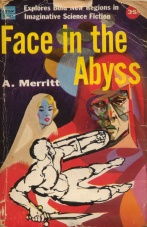
|
|
|
 A. Merritt, Dwellers In The Mirage (1932) A. Merritt, Dwellers In The Mirage (1932)
It can easily be argued that all fantasy is premised on the desire to return to bygone days when our needs were simple, when we believed in Santa Claus and Good overcoming Evil. By this point Merritt had developed a more sophisticated perspective, dealing with the tension between modern and primeval mores without taking the easy way out. Our latest scientist-adventurer hero, Leif Langdon, not only discovers a lost civilization or two, but also contains the spirit of a long-dead warrior-king locked away in his subconscious. As if that's not enough dualism, he meets and wins two beautiful women: the sweet, guileless Evalie, and the fearless, ruthless warrior-queen Lur.
Plus, he's either servant or master of the malevolent Khalk'ru, soul-drinking monster god from another dimension. How is Leif/Dwayanu going to sort all this stuff out? He doesn't, quite - just when you think there's a final resolution, the very last paragraph turns everything on its head - but he has a heck of a time trying.
Merritt had become quite an artful writer: he inserts the occasional purple passage, but generally keeps things moving at an appropriate pace (breakneck or thoughtful, depending on which half of Leif is in control). He still shares
Burroughs's proclivity for keeping his female characters nude whenever there's the slightest pretext, not that I'm complaining.
(DBW)
|
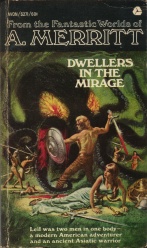
|
|
|
 A. Merritt, The Fox Woman & Other Stories (1947) A. Merritt, The Fox Woman & Other Stories (1947)
A collection of short stories (plus a couple of novel fragments), this doesn't show Merritt at his best but it's an interesting look at his unique position straddling the line between science fiction and fantasy. Apart from the title novella, which is a straight fantasy yarn, and the straightforward SF "The Last Poet And The Robots," all the main characters wonder if they're having true supernatural experiences or just experiencing the power of suggestion. One gets the feeling it's the former - particularly on the lushly written "The Women Of The Wood" - but the unsettling ambiguities are never resolved.
And the brevity of the pieces makes it easier to appreciate Merritt's talent at setting a scene, as his locations - whether a battlefield in France, a suite in Manhattan or a temple in the Yucatan - are rapidly and vividly realized. And while he doesn't have the space to introduce any lost races (apart from the offstage builders in "The People Of The Pit"), Merritt fans will be pleased to note that several stories feature mysterious, gorgeous, disconcertingly inhuman women.
(DBW)
|
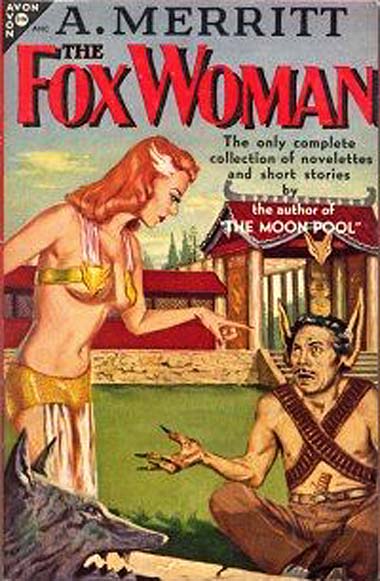
|
|
|
 Hope Mirrlees, Lud-in-the-Midst (1926) Hope Mirrlees, Lud-in-the-Midst (1926)
You know, I'm in favor of affirmative action.
So I'd really love to heap praise on the only pre-Tolkien female writer to make it to this page.
Unfortunately, the book is a wimpy waste of time.
Mirrlees confines the action to a prim, proper town and its surrounding countryside, which seems for all the world like some forgotten, thoroughly domestic corner of approximately mid-19th century England.
Outside lurks the shadowy Fairyland, the source of a steady supply of smuggled fairy fruit - kind of like some really good hash, except that it drives everyone permanently crazy.
Our middle-aged hero, the mayor of Lud, spends the novel chasing the conspiratorial smugglers around and trying to avoid getting tarred as One of Them.
All very dull, except that there's a dreamy, unpredictable denouement that's so fevered it's worthy of Dunsany.
And Mirrlees has a sure hand with dialogue, scenery, pacing, and characterization.
Nothing even vaguely exciting here if you're looking for far-away lands, sweeping romance, or epic battles, but at least it's quirky and comfortable. (JA)
|
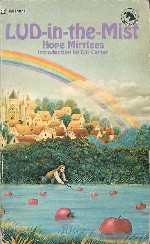
|
|
|
 Michael Moorcock, The Knight Of The Swords (1971) Michael Moorcock, The Knight Of The Swords (1971)
First book in the Corum series, starring Prince Corum Jhaelen Irsei, last of the noble Vadhagh race that is slaughtered by the villanous humans called the Mabden in the opening parts of the book.
Moorcock is a terrible writer in many ways, whipping through frequently grandiose plot developments far too quickly, underdeveloping characters, barely bothering to describe people and places, relying on coincidences, and generally just being a dork.
In other words, his novels are the textual equivalents of comic books.
Here, the vengeful hero is unsympathetic, the main human bad guy Glandyth-a-Krae is a drab, cliched figure, and even the battle scenes are dull.
Moorcock's elitism is offensive - the artsy intellectual Vadhagh are so so superior to the grubby hoi polloi humans that of course we all are to agree on the joys of aristocracy.
On the plus side, at least there's plenty of action, and Moorcock sometimes has a raving imagination - the big showdown with this book's Lord of Chaos, the title character, Arioch, is pretty far out.
And Corum's trusty body parts the Hand of Kwll and the Eye of Rhynn are fascinating.
The Hand unpredictably throttles characters who turn out to be dangerous, even when seeming harmless, while the Eye, when unshuttered, allows Corum to summon his dead former opponents from limbo to slaughter his current ones.
Then the current ones take their place in limbo, and so on, which leads to ridiculous but amusing battles.
Brainless fun.
(JA)
|
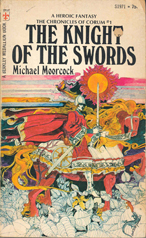
|
|
|
 C.L. Moore, Jirel Of Joiry (1977) C.L. Moore, Jirel Of Joiry (1977)
The first sword-and-sorcery heroine that anyone remembers, the red-haired, yellow-eyed
warrior-noble Jirel was the scourge of medieval France. Or so Moore keeps telling us: in
each of these five stories - first published in the '30s, but collected in book form much
later - Jirel seems in way over her head, hopelessly overmatched by dread supernatural
forces, usually escaping with her life only because of blind luck.
She kills exactly one guy in the whole book, and as soon as he's dead, she regrets it! In
addition, Jirel doesn't appear to be very bright, which necessitates mysterious characters
popping in from various dimensions to tell her what to do every step of the way, and has
next to no personality. Moore's writing is flat, with endless yet vague descriptions of
a succession of gloomy fantasy worlds, no regard for characterization, and a depressingly
functional approach to plotting... She's got the superficiality and stylelessness
of pulp, without the raw thrills that make it readable.
But if you persist past the first four tales,
the last one is a beaut: "Hellsgarde" is an unpredictable haunted house tale with some
startling images, and an eerie atmosphere which the earlier stories try but dismally fail
to conjure.
(DBW)
|
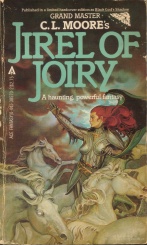
|
|
|
 William Morris, The Wood Beyond The World (1895) William Morris, The Wood Beyond The World (1895)
Morris, better known as a leader of the pre-Raphaelite movement in the graphic arts and, like Dunsany, an eccentric genre-jumper, unquestionably invented the modern high fantasy genre.
That's cool, but he's also just kind of clumsy.
His plots, characters, and dialogue are frequently wooden, and he just doesn't have a lot of flair - unlike, say, Dunsany, he's not one to toss off a lot of colorful make-believe proper nouns.
Nonetheless, apart from Eddison, Morris was the only writer before Tolkien to fuse magic, exactingly made-up geography, heroic quests, and battle scenes, and there's truly something Tolkien-esque about Morris' everyman heroes and their down-to-earth behavior, even with such surreal backdrops.
Wood Beyond the World is pretty trivial; the basic story of a young man ensnared by a witch and escaping with the witch's female captive is a bit slight for an entire novel.
Nonetheless, Morris' characters have strikingly believable interior lives, and the women are practically proto-feminists - the sexually predatory witch in this book does get her just desserts, but we're talking about the late Victorian era here, for goodness' sake.
Without a lot of magic, a pretty limited milieu, and with a poor excuse for a monster - a scary but wholly mortal dwarf who's not key to the plotline - the book just isn't as interesting as his next effort.
The ending is also ludicrous; you wish Morris had called it quits a few dozen pages earlier.
But it's a lot more entertaining than some of the other stuff my weird little fantasy obsession has led me to. (JA)
|
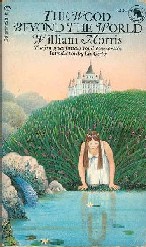
|
|
|
 William Morris, The Well At The World's End (1896) William Morris, The Well At The World's End (1896)
Morris' only other stab at pure fantasy writing - he wrote many other novels - is a big improvement, although it's twice as long as Beyond the World.
Our sturdy hero, the young provincial knight Ralph, goes on a lengthy quest through a decidedly medieval alternate world to find a spring of eternal life, fighting his way through quite a few situations and visiting all sorts of realistically drawn locales.
Morris tends to be quite literal, so it's not till close to the end that things get downright hallucinatory.
In between, though, there are plenty of economically drawn characters and entertaining plot developments, and the two women Ralph falls in love with are both strongly drawn, especially the resourceful Ursula, who accompanies him through the end of the book.
Listen, there's nothing even vaguely as good as Tolkien.
But the strong resemblances between this work and the Trilogy, albeit coincidental, make the novel well worth tracking down. (JA)
|
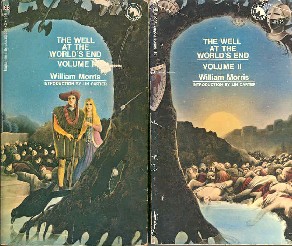
|
|
|
Mervyn Peake, Titus Groan (1946)
 - Bizarre, boring, and belabored, this 500 page monster is an obsessive portrayal of a timeless, enormous, sprawling castle and its cast of unpleasant and endlessly eccentric inhabitants.
From the shell-shocked Earl of Gormenghast to the manipulative but basically unimpressive teenage villain Steerpike, there isn't one truly admirable character to be found, although some of them are pitiable instead of grotesque.
Peake's disconnected subplots unfold glacially, the assorted conflicts seem trivial, the characters just seem to spin their gears after being introduced, and his creepy little world seems to float in space.
He also gets carried away with weird similes and obsessive (if clever) detailing of behavioral quirks.
With no sex, no magic, and hardly any violence, the book hardly qualifies as high fantasy anyway.
But Peake's imagination is fairly wild, he pulls off some technically impressive writing experiments, and the sweeping Gothic weirdness of it all may carry you away.
Still, I'm not really looking forward to the sequels Gormenghast and Titus Alone. (JA) - Bizarre, boring, and belabored, this 500 page monster is an obsessive portrayal of a timeless, enormous, sprawling castle and its cast of unpleasant and endlessly eccentric inhabitants.
From the shell-shocked Earl of Gormenghast to the manipulative but basically unimpressive teenage villain Steerpike, there isn't one truly admirable character to be found, although some of them are pitiable instead of grotesque.
Peake's disconnected subplots unfold glacially, the assorted conflicts seem trivial, the characters just seem to spin their gears after being introduced, and his creepy little world seems to float in space.
He also gets carried away with weird similes and obsessive (if clever) detailing of behavioral quirks.
With no sex, no magic, and hardly any violence, the book hardly qualifies as high fantasy anyway.
But Peake's imagination is fairly wild, he pulls off some technically impressive writing experiments, and the sweeping Gothic weirdness of it all may carry you away.
Still, I'm not really looking forward to the sequels Gormenghast and Titus Alone. (JA)
 - I don't much disagree with Alroy's characterization, but I enjoyed the moody, dyspeptic writing so much I didn't care whether the plot ever resolved or not. It's not high fantasy at all - the story of the fading rulers of a crumbling castle is more a metaphor for the end of the British Empire than anything else - but it's a unique trip. Read the first page in a bookstore: either it'll grab you right away or you should just move on. I haven't scanned the cover of Gormenghast yet, so I'll write that review later, but it's the high point of the trilogy, with an honest-to-goodness plot and even some character development. Titus Alone, on the other hand, is dull self-indulgent dreck set in some version of the modern world. (DBW) - I don't much disagree with Alroy's characterization, but I enjoyed the moody, dyspeptic writing so much I didn't care whether the plot ever resolved or not. It's not high fantasy at all - the story of the fading rulers of a crumbling castle is more a metaphor for the end of the British Empire than anything else - but it's a unique trip. Read the first page in a bookstore: either it'll grab you right away or you should just move on. I haven't scanned the cover of Gormenghast yet, so I'll write that review later, but it's the high point of the trilogy, with an honest-to-goodness plot and even some character development. Titus Alone, on the other hand, is dull self-indulgent dreck set in some version of the modern world. (DBW)
|
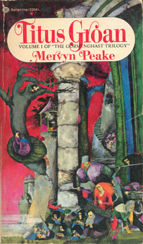
|
|
|
 Fletcher Pratt, The Well Of The Unicorn (1948) Fletcher Pratt, The Well Of The Unicorn (1948)
I'm not really sure what genre this adventure story fits into, because it's too boring to be pure swords & sorcery, and too unsophisticated to be high fantasy a la Tolkien.
There are some hints of Tolkien: the hero collects a rag-tag band of warriors to run literally in circles around an extremely complicated landscape, challenging and ultimately overthrowing the Powers That Be; there's more emphasis on battles than on mano a mano swordplay; and there's tons of obscure vocabulary and piles of proper nouns that are rooted in Norse, showing some scholarship.
The 1978 edition even sports a detailed Tolkien-style map (does anyone know if it was in the original?).
But the writing style is stiff, the characters are two-dimensional, everything is described vaguely, there's a bunch of impenetrable political philosophizing, and there's no sense of grandeur - just bargain basement wizardry, small-scale military action, and the occasional monster.
Basically, Pratt wouldn't know a poetic phrase if one hit him over the head.
Meanwhile, the good guys aren't particularly good, nor are the bad guys particularly bad, so you never have any emotional stake in their struggle.
Worst of all, our young hero Airar seems wimpy, naive, and even a bit dimwitted, and it's never clear why anyone would follow him into battle, much less get mixed up with him romantically, as all three of the major female characters do in some quickly described sex scenes. (JA)
|
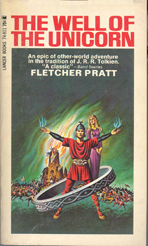
|
|
|
 Clark Ashton Smith, Hyperborea (1926 - 1958, collected 1971) Clark Ashton Smith, Hyperborea (1926 - 1958, collected 1971)
With Lovecraft and Howard, his close colleagues, Smith was one of the greatest and most prolific of 1930s pulp fantasy writers.
Smith has a huge Dunsany influence: elegant, poetic, and economical language; quickly sketched but exotic settings; bizarre and horrifying monsters, often demi-gods; minimal swordplay; extravagant, vaguely Eastern made up names; clever, ironic last-minute plot twists; and the attention span of a two year old - characters rarely turn up more than once.
Unlike Dunsany and like Lovecraft, he brings an element of horror, not just wonder, into almost every story.
This collection, mostly from the early 1930s, is a loose cycle of stories set in the mythical land of Hyperborea; the other BAF collections (Zothique, Xiccarph, and Poseidonis) are also cycles of this kind.
Hyperborea is a distantly prehistoric, vaguely northern continent, which is eventually gets clobbered by advancing ice sheets, but still has varied climates and a wacky mishmash of extinct animals.
Irritatingly, Smith keeps reusing the same plot device: a vaguely unsympathetic thief, unscrupulous magician, etc. gets drawn into a creepy locale, where he meets his comeuppance at the hands of a nasty, otherworldly monster, which is typically obese, tentacled, and just generally the worst possible house guest.
Well, okay, sometimes the hero survives with little more than an amputated limb...
But Smith is such a masterful, enjoyable story teller that you hardly even mind: he's wonderfully visual, he has a huge and entertaining vocabulary, and he often generates laugh out loud, tongue in cheek humor.
He's not on Dunsany's artistic level, but I think he's a cut above Howard, and if you like dark fantasy he's a must read.
|
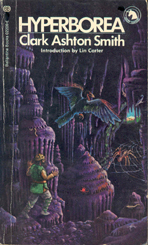
|
|
|
 J. R. R. Tolkien, Smith Of Wootton Major and Farmer Giles Of Ham (1967, 1949) J. R. R. Tolkien, Smith Of Wootton Major and Farmer Giles Of Ham (1967, 1949)
Tolkien's two best-known non-Middle Earth works, short novellas packaged together as a single paperback, are entertaining but a bit lightweight.
"Wootton Major" is an engaging, typically majestic tale of a smith who travels back and forth between his village and Faery, and interacts with a mysterious cook who turns out to be something other than what he seems.
It's actually Dunsany-like, not so different from (say) Elfland's Daughter, and worth reading, although it's a bit drab.
"Farmer Giles" is a hoot, the only case where Tolkien let his hair down and wrote an extended piece of humor.
The earthy, egotistical Farmer Giles' almost non-chalant conquests of an amusingly dimwitted giant and a not-quite-as-clever-as-he-thinks dragon are non-stop fun, and Tolkien knows how to quit before he outwears his welcome.
There's no particular reason for Middle Earth obsessives to take this kind of a detour, except that the man's tremendous writing skills are fully on display. (JA)
I don't remember Wootton Major, but Giles is indeed a blast. (DBW)
|
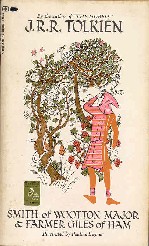
|
|
|
J. R. R. Tolkien, The Silmarillion (1977)
 - Tolkien's big labor of love, arguably more important to him than even the Trilogy, is kind of a drag.
Laying out Tolkien's incredibly detailed history of the First Age (remember, LOTR takes place in the Third Age), the book was patched together by Tolkien's son Christopher from multiple drafts written almost over Tolkien's entire adult life.
In places the writing has the easy, assured tone of Tolkien's better-known works, but in passages drawn from early manuscripts, it's rigid and almost like the Old Testament in its attention to historical detail at the expense of (say) little things like dialogue, pacing, and characterization.
The first third, concerned with Tolkien's Norse and Greek pantheon-like cosmology, is especially painful; it might just stop you cold before you get to the substantially more enjoyable tales of elven kingdoms fighting it out over the ages with Sauron's more powerful predecessor Morgoth - men and dwarves are minor characters here, and hobbits, with all their humor and humanity, are completely absent.
Still, Tolkien whips out a large array of different characters and episodes, many of which are quite interesting, so if you're going to be a saint and actually finish the book you'll find it rewarding - I can't remember, but I think I failed to do so at age 11 when it came out; it was the most eagerly received Christmas present of my entire childhood. (JA) - Tolkien's big labor of love, arguably more important to him than even the Trilogy, is kind of a drag.
Laying out Tolkien's incredibly detailed history of the First Age (remember, LOTR takes place in the Third Age), the book was patched together by Tolkien's son Christopher from multiple drafts written almost over Tolkien's entire adult life.
In places the writing has the easy, assured tone of Tolkien's better-known works, but in passages drawn from early manuscripts, it's rigid and almost like the Old Testament in its attention to historical detail at the expense of (say) little things like dialogue, pacing, and characterization.
The first third, concerned with Tolkien's Norse and Greek pantheon-like cosmology, is especially painful; it might just stop you cold before you get to the substantially more enjoyable tales of elven kingdoms fighting it out over the ages with Sauron's more powerful predecessor Morgoth - men and dwarves are minor characters here, and hobbits, with all their humor and humanity, are completely absent.
Still, Tolkien whips out a large array of different characters and episodes, many of which are quite interesting, so if you're going to be a saint and actually finish the book you'll find it rewarding - I can't remember, but I think I failed to do so at age 11 when it came out; it was the most eagerly received Christmas present of my entire childhood. (JA)
 - Let's face it: Tolkien was a nut. An incredibly talented nut, but a nut all the same. All the languages and races and thousands of years of history weren't sprinkled throughout LotR to give the illusion of depth: he really did create an imaginary world of unfathomable depth, over a period of decades. And thanks to Christopher, you can read as much of the backstory as you want. This scholarly tome is written like a history book, and the principal narrative about the fallen angel and the stolen talisman and the Great War is 1) just Christian allegory to start with; and 2) the exact same plot as the Lord of the Rings.
(DBW) - Let's face it: Tolkien was a nut. An incredibly talented nut, but a nut all the same. All the languages and races and thousands of years of history weren't sprinkled throughout LotR to give the illusion of depth: he really did create an imaginary world of unfathomable depth, over a period of decades. And thanks to Christopher, you can read as much of the backstory as you want. This scholarly tome is written like a history book, and the principal narrative about the fallen angel and the stolen talisman and the Great War is 1) just Christian allegory to start with; and 2) the exact same plot as the Lord of the Rings.
(DBW)
|
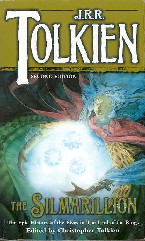
|
|
|
J. R. R. Tolkien, Unfinished Tales (1980)
 - Argh, if only J. R. R. had gotten his act together and finished some of the stuff he started before retiring and just losing it.
This book cobbles together the best of Tolkien's Middle Earth-related writing fragments, including an excellent hundred-page epic story of the First Age - arguably Tolkien's most poignant tragedy - that just stops in the middle; some reasonably entertaining stories about the second age (dominated by the Numenor, Aragorn's half-elven ancestors); and several mostly historical-style accounts of key episodes in the history of the Third Age, none of which are important enough to have gone into the Trilogy.
It's an incoherent grab-bag, but frankly it's more fun in many places than The Silmarillion, and if you've read LOTR three or more times you might get some relief by moving on to this stuff.
Listen, you don't want your eyeballs to fall out of your head.
After this Christopher Tolkien put out a long series of other manuscripts by his father, none of which seem important, since frequently the material is just early drafts of works like the Trilogy and The Silmarillion. (JA) - Argh, if only J. R. R. had gotten his act together and finished some of the stuff he started before retiring and just losing it.
This book cobbles together the best of Tolkien's Middle Earth-related writing fragments, including an excellent hundred-page epic story of the First Age - arguably Tolkien's most poignant tragedy - that just stops in the middle; some reasonably entertaining stories about the second age (dominated by the Numenor, Aragorn's half-elven ancestors); and several mostly historical-style accounts of key episodes in the history of the Third Age, none of which are important enough to have gone into the Trilogy.
It's an incoherent grab-bag, but frankly it's more fun in many places than The Silmarillion, and if you've read LOTR three or more times you might get some relief by moving on to this stuff.
Listen, you don't want your eyeballs to fall out of your head.
After this Christopher Tolkien put out a long series of other manuscripts by his father, none of which seem important, since frequently the material is just early drafts of works like the Trilogy and The Silmarillion. (JA)
 - "Narn I Hîn Húrin" is terrific, probably the Tolkien fragment that best captures the sweep and drama of the Trilogy... it's so iconic I keep thinking he must've ripped it off from some old Icelandic myth. But the rest is only intermittently interesting.
I got off the Christopher-digs-though-the-archives train soon after this: I have the Book of Lost Tales Volume I, but don't remember it well enough to review it.
(DBW) - "Narn I Hîn Húrin" is terrific, probably the Tolkien fragment that best captures the sweep and drama of the Trilogy... it's so iconic I keep thinking he must've ripped it off from some old Icelandic myth. But the rest is only intermittently interesting.
I got off the Christopher-digs-though-the-archives train soon after this: I have the Book of Lost Tales Volume I, but don't remember it well enough to review it.
(DBW)
|
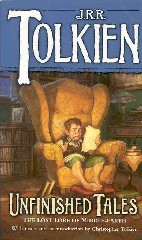
|
|
|
 Evangeline Walton, The Island Of The Mighty (1936) Evangeline Walton, The Island Of The Mighty (1936)
Originally titled The Virgin And The Swine - no kidding - this very literary novel is a retelling of the Fourth Branch of the Mabinogion, the Welsh national epic that blends history and fantasy.
It consists of three interrelated tales centering on prince Gwydion; his selfish, love-stricken brother Gilvaethwy; Gwydion's cursed son Llew; Llew's nemesis, his mother and Gwydion's sister Arianrhod; and Llew's unfaithful wife Blodeuwedd.
Jam-packed with fairy tale-style magic - a lot of people turning into animals and the like - the story is so far removed from reality that it essentially takes place in a fantasy world.
Walton follows the original's plot and even dialogue very closely, so frequently it makes little sense.
But she pads it out enormously with rich, metaphorical, descriptive prose and complex psychological analyses, adopting a serious tone that somehow makes the wild plot developments believable and never cartoonish.
However, there's too much dialogue and not enough action.
Walton often feels obligated to interrupt the narrative with annoying comments about just what is or is not actually in the Mabinogion.
And her main theme can get annoying: a revisionist, proto-feminist take on the imagined struggle between the matrilineal, marriage-avoiding Picts (not clearly identified in the original Mabinogion) and more conventional Celts.
You wish she'd stop musing on gender relations for, say, a whole page or two.
Still, it's a beautifully written effort that's about as close to Tolkien as (say) Eddison.
After this Walton came out of retirement to write three more Mabinogion novels for Carter's BAF series.
|
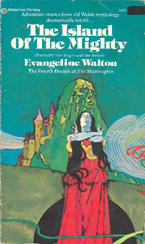
|
|
|
 Evangeline Walton, The Children Of Llyr (1971) Evangeline Walton, The Children Of Llyr (1971)
The second novel in the series, based on the Second Branch of the Mabinogion, is a big step down.
Not a lot happens in the Second Branch, so Walton obsesses with psychological detail here.
The assorted Welsh nobles, the eponymous children of Llyr, scheme to succeed Matholuch, King of Ireland, by marrying off their sister Branwen to him.
She indeed has a son, Gwern, but before the houses can be united, the malicious brother Evnissyen embarasses the Irish, and Matholuch then provokes a war by mistreating Branwen.
There's some entertainment for sure; the incredibly gigantic Welsh king Bran, who features in the latter part of the book as a talking decapitated head, is pretty impressive, and the major feature of the war is the endless slew of undead warriors produced by throwing corpses in the Irishmen's magical cauldron, stolen from the netherworld.
But frequently the plotline, very closely taken from the original source, is meandering and nonsensical, as with the subplot concerning the monstrous Kymideu Kymeinvoll and his ferocious, magically begotten chidren.
It's just a much slower read than the preceding novel.
|
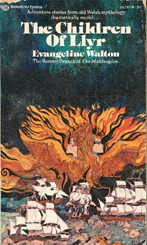
|
|
|
 Roger Zelazny, Nine Princes In Amber (1970) Roger Zelazny, Nine Princes In Amber (1970)
Picking up where Heinlein left off with Glory Road, this is a slapdash comic book tale that starts off with a studly hero finding himself swept into a quasi-medieval fantasy world.
This time, though, our protagonist Corwin is a bona fide prince from that world - Amber - whose car crash-induced amnesia slowly and somewhat interestingly peels away as he engages in an implausible internecine struggle with and against his treacherous, quasi-immortal royal siblings.
There are some clever ideas here - the siblings have magic decks of cards, kind of like high-powered cell phones, allowing them not just to contact each other at any time, but draw each other across space.
But the whole thing is so goofy and leans so heavily on deus ex machina plot devices that you can't take it seriously for a second, especially the huge broad-brush war that occupies much of the book.
It is mostly fun, and much of the latter part at least has some versimilitude, involving Corwin's creative escape from his lengthy imprisonment, which is reminiscent of the fascinating imprisonment sequence in Jack Of Shadows.
But I'm not expecting too much of the book's multiple sequels.
|
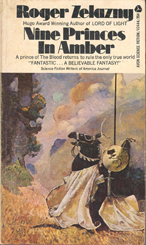
|
|
|
 Roger Zelazny, Jack Of Shadows (1971) Roger Zelazny, Jack Of Shadows (1971)
This time Zelazny's scenario is pretty intriguing: a world half in darkness, half in light, the magical darkside populated by immortal, soulless sorcerors, the dayside not so different from our own world.
The darksider/thief Jack, who draws his power from shadows, embarks on a quest for revenge that turns into a struggle for conquest of the entire darkside.
Entertaining stuff, but at the length of a novella it's just too much to pack in.
There are big leaps in the plotline, things are described tersely, conversations are rapid-fire, there's no philosophical musing or significant internal dialogue or anything like that, and all of the characters but Jack seem like cartoons.
Although there are parallels with Tolkien such as a solitary quest through some hellish landscapes to destroy a great device of power, the book is really a hybrid of fantasy and science fiction that doesn't show a strong influence.
The tone is also frustratingly inconsistent, mostly pure fantasy at the start, somewhat cynical during an interlude on the dayside, and tongue-in-cheek with some downright humor toward the end.
But it's definitely not hack work, with such a fast-moving and somewhat unpredictable plot it is a page turner, and Zelazny's imagination is pretty impressive - at points he's similar to Dunsany, or perhaps Lovecraft. (JA)
|
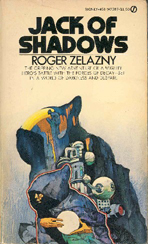
|
|
Have I talked you out of battered old fantasy novels?
Well, how about an endless array of second-rate rock records, a bunch of unbelievably dull history of biology books, or the entire fossil record of everything?
|
Poul Anderson, Three Hearts And Three Lions (1961)

Hannes Bok, The Sorcerer's Ship (1942)

James Branch Cabell, The Cream Of The Jest (1917)

James Branch Cabell, Jurgen (1919)

James Branch Cabell, Domnei (1920/26)

Joy Chant, Red Moon And Black Mountain (1971)

Lord Dunsany, At The Edge Of The World (1906 - 1916, collected 1970)

Lord Dunsany, Beyond The Fields We Know (1905 - 1929, collected 1972)

Lord Dunsany, Don Rodriguez: The Chronicles Of Shadow Valley (1922)

Lord Dunsany, The King Of Elfland's Daughter (1924)

- The most well-constructed work of Dunsany's I've read is also his least charming, focusing on the adventures of a pallidly sketched young man in the "Golden Age" of Spain (there's so little geographic or cultural detail it could just about be anywhere anywhen). Don Ramon Alonzo leaves home to make a killing in the transmuted gold business by apprenticing to a rather distant and intermittently malign magician, but gets sidetracked by trying to rescue the magician's ancient female servant (you can see where that's going right away). There is a bunch of imaginative magic going on, including the central device of both characters having literally pawned their own shadows to the creepy old guy. Shuttling back and forth between Ramon Alonzo's small family castle, the magician's lair, and a nearby town, it's a pretty self-contained world, but Dunsany creates some involving dramatic incidents and his language is as beautiful (if not as rapturous) as always. (JA)
- This was the first Dunsany I picked up, and I was hooked from the opening pages, where Ramon Alonzo recoils in horror at the thought of working for a living, and goes off to become a magician instead. The prose is distinctly otherworldly without being needlessly archaic, the plot moves at a good clip, the touches of humor never detract from the overall tone - in all of these areas, Dunsany excelled nearly all the fantasists who would come after him. And you may never take your shadow for granted again. (DBW)

- God-like heroes, lovingly depicted battles, vast landscapes, deathly visions, terrifying monsters, whiplash-inducing plot twists, epic quests, gaudy palace decor, naval battles, fierce little kingdoms with misleadingly monstrous names, vertigo-inducing mountain climbing, a bizarre plot resolution, even some discreet sex - E. R. Eddison throws everything imaginable at the reader. Actually, he throws everything almost unintelligible at the reader, because he's a hard-core Elizabethan scholar, so he lards the text with some of the most difficult Shakespearean English you could possibly imagine. I literally had to read this can't-put-it-down 500 page book with a dictionary in one hand, looking up as many as a dozen words per page. But hey, it's educational! No pain, no gain, right? The war-loving Demons aren't the most sympathetic good guys in the world, but talk about villanous villains: the Witches are as bad as bad gets, complete with a fascinatingly treacherous key player. Eddison was unquestionably an imperialistic, sexist, racist he-man, with none of Tolkien's common touch - he was practically a proto-Nazi, and it's no coincidence the humanistic Tolkien knew but despised the man. But if you're going to go anywhere back before Tolkien, I think this is the place to start, as I did. (JA)
- One of a very few books (with Tristram Shandy and the Bill James Baseball Abstracts) I re-read regularly. It starts slow, with practically pornographic descriptions of the enormous glistening jewels adorning the Demons' throne room as some loser named Lessingham asks dumb questions, but once it gets going you're immersed in a world of wondrous extremes, where you can count on nothing ordinary happening. Brandoch Daha is a paradoxically foppish hero, Lord Gro is one of literature's great villains, and the minor figures like Lady Sriva are whisked offstage while there's still some mystery to them. "'Tis writ somewhat crabbedly," no doubt, and Eddison's bloodlust may be hard to stomach, but if you can hang in with it, the book's rewards are incomparable. (DBW)

E. R. Eddison, Mistress Of Mistresses (1935)

Robert Heinlein, Glory Road (1963)

Ursula K. Le Guin, A Wizard of Earthsea (1969)

Ursula K. Le Guin, The Tombs of Atuan (1970)

Ursual K. Le Guin, Orsinian Tales (1976)

David Lindsay, A Voyage To Arcturus (1920)

P. M. Matarasso (translator), The Quest Of The Holy Grail (1969)

A. Merritt, The Moon Pool (1919)

A. Merritt, The Metal Monster (1920)

A. Merritt, The Ship Of Ishtar (1924)

A. Merritt, Face In The Abyss (1931)

A. Merritt, Dwellers In The Mirage (1932)

A. Merritt, The Fox Woman & Other Stories (1947)

Hope Mirrlees, Lud-in-the-Midst (1926)

Michael Moorcock, The Knight Of The Swords (1971)

C.L. Moore, Jirel Of Joiry (1977)

William Morris, The Wood Beyond The World (1895)

William Morris, The Well At The World's End (1896)

- Bizarre, boring, and belabored, this 500 page monster is an obsessive portrayal of a timeless, enormous, sprawling castle and its cast of unpleasant and endlessly eccentric inhabitants. From the shell-shocked Earl of Gormenghast to the manipulative but basically unimpressive teenage villain Steerpike, there isn't one truly admirable character to be found, although some of them are pitiable instead of grotesque. Peake's disconnected subplots unfold glacially, the assorted conflicts seem trivial, the characters just seem to spin their gears after being introduced, and his creepy little world seems to float in space. He also gets carried away with weird similes and obsessive (if clever) detailing of behavioral quirks. With no sex, no magic, and hardly any violence, the book hardly qualifies as high fantasy anyway. But Peake's imagination is fairly wild, he pulls off some technically impressive writing experiments, and the sweeping Gothic weirdness of it all may carry you away. Still, I'm not really looking forward to the sequels Gormenghast and Titus Alone. (JA)
- I don't much disagree with Alroy's characterization, but I enjoyed the moody, dyspeptic writing so much I didn't care whether the plot ever resolved or not. It's not high fantasy at all - the story of the fading rulers of a crumbling castle is more a metaphor for the end of the British Empire than anything else - but it's a unique trip. Read the first page in a bookstore: either it'll grab you right away or you should just move on. I haven't scanned the cover of Gormenghast yet, so I'll write that review later, but it's the high point of the trilogy, with an honest-to-goodness plot and even some character development. Titus Alone, on the other hand, is dull self-indulgent dreck set in some version of the modern world. (DBW)

Fletcher Pratt, The Well Of The Unicorn (1948)

Clark Ashton Smith, Hyperborea (1926 - 1958, collected 1971)

J. R. R. Tolkien, Smith Of Wootton Major and Farmer Giles Of Ham (1967, 1949)

- Tolkien's big labor of love, arguably more important to him than even the Trilogy, is kind of a drag. Laying out Tolkien's incredibly detailed history of the First Age (remember, LOTR takes place in the Third Age), the book was patched together by Tolkien's son Christopher from multiple drafts written almost over Tolkien's entire adult life. In places the writing has the easy, assured tone of Tolkien's better-known works, but in passages drawn from early manuscripts, it's rigid and almost like the Old Testament in its attention to historical detail at the expense of (say) little things like dialogue, pacing, and characterization. The first third, concerned with Tolkien's Norse and Greek pantheon-like cosmology, is especially painful; it might just stop you cold before you get to the substantially more enjoyable tales of elven kingdoms fighting it out over the ages with Sauron's more powerful predecessor Morgoth - men and dwarves are minor characters here, and hobbits, with all their humor and humanity, are completely absent. Still, Tolkien whips out a large array of different characters and episodes, many of which are quite interesting, so if you're going to be a saint and actually finish the book you'll find it rewarding - I can't remember, but I think I failed to do so at age 11 when it came out; it was the most eagerly received Christmas present of my entire childhood. (JA)
- Let's face it: Tolkien was a nut. An incredibly talented nut, but a nut all the same. All the languages and races and thousands of years of history weren't sprinkled throughout LotR to give the illusion of depth: he really did create an imaginary world of unfathomable depth, over a period of decades. And thanks to Christopher, you can read as much of the backstory as you want. This scholarly tome is written like a history book, and the principal narrative about the fallen angel and the stolen talisman and the Great War is 1) just Christian allegory to start with; and 2) the exact same plot as the Lord of the Rings. (DBW)

- Argh, if only J. R. R. had gotten his act together and finished some of the stuff he started before retiring and just losing it. This book cobbles together the best of Tolkien's Middle Earth-related writing fragments, including an excellent hundred-page epic story of the First Age - arguably Tolkien's most poignant tragedy - that just stops in the middle; some reasonably entertaining stories about the second age (dominated by the Numenor, Aragorn's half-elven ancestors); and several mostly historical-style accounts of key episodes in the history of the Third Age, none of which are important enough to have gone into the Trilogy. It's an incoherent grab-bag, but frankly it's more fun in many places than The Silmarillion, and if you've read LOTR three or more times you might get some relief by moving on to this stuff. Listen, you don't want your eyeballs to fall out of your head. After this Christopher Tolkien put out a long series of other manuscripts by his father, none of which seem important, since frequently the material is just early drafts of works like the Trilogy and The Silmarillion. (JA)
- "Narn I Hîn Húrin" is terrific, probably the Tolkien fragment that best captures the sweep and drama of the Trilogy... it's so iconic I keep thinking he must've ripped it off from some old Icelandic myth. But the rest is only intermittently interesting. I got off the Christopher-digs-though-the-archives train soon after this: I have the Book of Lost Tales Volume I, but don't remember it well enough to review it. (DBW)

Evangeline Walton, The Island Of The Mighty (1936)

Evangeline Walton, The Children Of Llyr (1971)

Roger Zelazny, Nine Princes In Amber (1970)

Roger Zelazny, Jack Of Shadows (1971)
